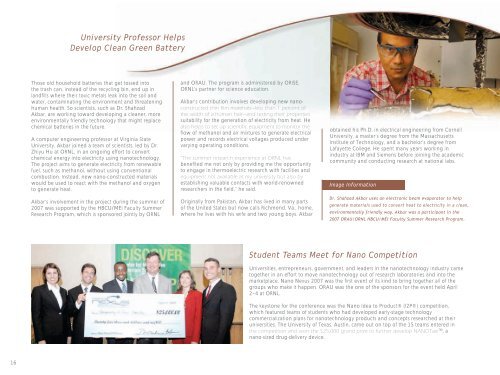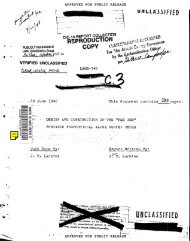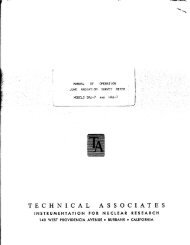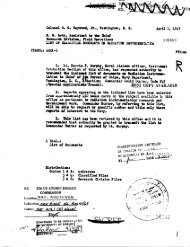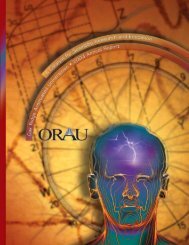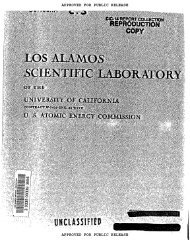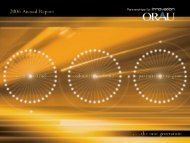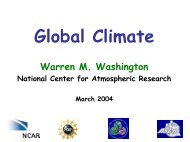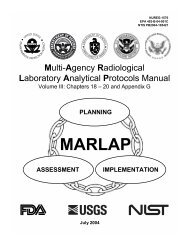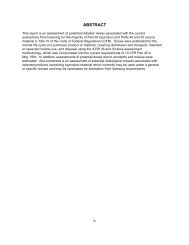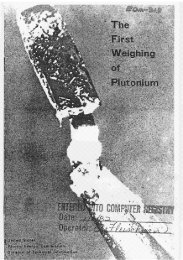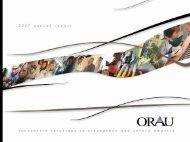2007 ORAU Annual Report - Oak Ridge Associated Universities
2007 ORAU Annual Report - Oak Ridge Associated Universities
2007 ORAU Annual Report - Oak Ridge Associated Universities
Create successful ePaper yourself
Turn your PDF publications into a flip-book with our unique Google optimized e-Paper software.
University Professor Helps<br />
Develop Clean Green Battery<br />
Those old household batteries that get tossed into<br />
the trash can, instead of the recycling bin, end up in<br />
landfills where their toxic metals leak into the soil and<br />
water, contaminating the environment and threatening<br />
human health. So scientists, such as Dr. Shahzad<br />
Akbar, are working toward developing a cleaner, more<br />
environmentally friendly technology that might replace<br />
chemical batteries in the future.<br />
A computer engineering professor at Virginia State<br />
University, Akbar joined a team of scientists, led by Dr.<br />
Zhiyu Hu at ORNL, in an ongoing effort to convert<br />
chemical energy into electricity using nanotechnology.<br />
The project aims to generate electricity from renewable<br />
fuel, such as methanol, without using conventional<br />
combustion. Instead, new nano-constructed materials<br />
would be used to react with the methanol and oxygen<br />
to generate heat.<br />
Akbar’s involvement in the project during the summer of<br />
<strong>2007</strong> was supported by the HBCU/MEI Faculty Summer<br />
Research Program, which is sponsored jointly by ORNL<br />
and <strong>ORAU</strong>. The program is administered by ORISE,<br />
ORNL’s partner for science education.<br />
Akbar’s contribution involves developing new nanoconstructed<br />
thin film materials—less than 1 percent of<br />
the width of a human hair—and testing their properties<br />
suitability for the generation of electricity from heat. He<br />
also helps to set up scientific equipment to monitor the<br />
flow of methanol and air mixtures to generate electrical<br />
power and records electrical voltages produced under<br />
varying operating conditions.<br />
“The summer research experience at ORNL has<br />
benefited me not only by providing me the opportunity<br />
to engage in thermoelectric research with facilities and<br />
equipment not available at my university but also by<br />
establishing valuable contacts with world-renowned<br />
researchers in the field,” he said.<br />
Originally from Pakistan, Akbar has lived in many parts<br />
of the United States but now calls Richmond, Va., home,<br />
where he lives with his wife and two young boys. Akbar<br />
obtained his Ph.D. in electrical engineering from Cornell<br />
University, a master’s degree from the Massachusetts<br />
Institute of Technology, and a bachelor’s degree from<br />
Lafayette College. He spent many years working in<br />
industry at IBM and Siemens before joining the academic<br />
community and conducting research at national labs.<br />
Image Information<br />
Dr. Shahzad Akbar uses an electronic beam evaporator to help<br />
generate materials used to convert heat to electricity in a clean,<br />
environmentally friendly way. Akbar was a participant in the<br />
<strong>2007</strong> <strong>ORAU</strong>/ORNL HBCU/MEI Faculty Summer Research Program.<br />
Student Teams Meet for Nano Competition<br />
<strong>Universities</strong>, entrepreneurs, government, and leaders in the nanotechnology industry came<br />
together in an effort to move nanotechnology out of research laboratories and into the<br />
marketplace. Nano Nexus <strong>2007</strong> was the first event of its kind to bring together all of the<br />
groups who make it happen. <strong>ORAU</strong> was the one of the sponsors for the event held April<br />
2–4 at ORNL.<br />
The keystone for the conference was the Nano Idea to Product® (I2P®) competition,<br />
which featured teams of students who had developed early-stage technology<br />
commercialization plans for nanotechnology products and concepts researched at their<br />
universities. The University of Texas, Austin, came out on top of the 15 teams entered in<br />
the competition and won the $25,000 grand prize to further develop NANOTaxi TM , a<br />
nano-sized drug-delivery device.<br />
16


